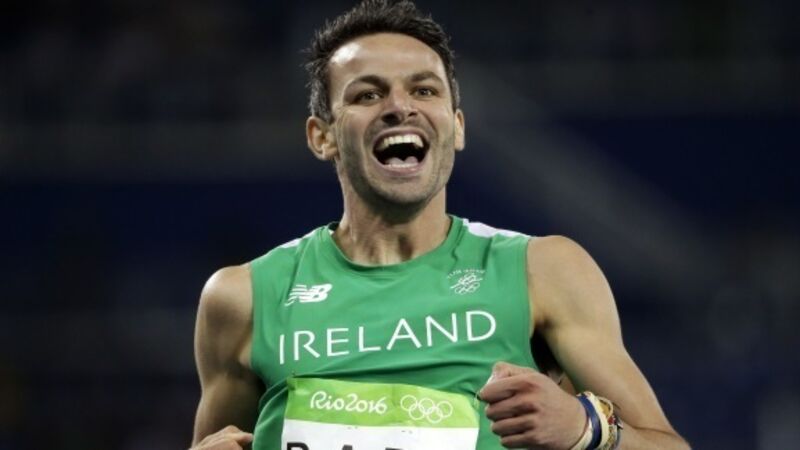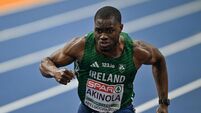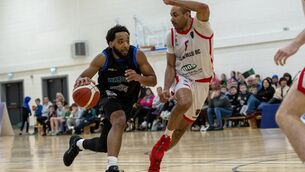Thomas Barr boldly goes fourth

So he lay there waiting, exhausted, staring up at a giant screen that he wished — oh boy, did he wish — would flash his name up in third place. What he saw next hit him like a kidney punch: Yasmani Copello, TUR, 47.92.
The initial reaction was one of disgust, but when he saw it there in objective numbers — his place, his name, his country, his national record — he couldn’t repel the surge of overwhelming pride: Thomas Barr, IRL, 47.97.
“Fourth is probably the best and the worst place to come outside the medals, especially when I was so close,” he said. “But I was coming into this with really, really haphazard preparation, so it’s an absolutely astonishing feat. I left everything on the track and I’m absolutely thrilled.”
It had been a nervous beginning, the worst kind, as Javier Culson of Puerto Rico was disqualified for a false start. As if being the first Irish athlete in 84 years to occupy a lane in an Olympic sprint final wasn’t bad enough, Barr was left with more time to ponder the gravity of the situation — of the fans here in Rio and at home in Waterford, or at his training base in UL, where they gathered around big screens to witness his run at history.
“I came out quite nervous today because I felt the last two rounds in my legs,” he said. “I felt good mentally, but physically I felt quite tired and lethargic.”
The moment the gun fired, however, that all faded into oblivion. Barr ran his usual steady race over the first six hurdles, putting himself within striking distance to launch his final explosive effort down the home straight. However, running at a pace he had yet to encounter in a 400m hurdles race, he met the seventh hurdle on an awkward, slightly stuttering stride.
Watch an elated Thomas Barr: ‘There’s nothing like an Olympics’ https://t.co/1gT8ctWRaV pic.twitter.com/TMrPRLe7cy
— Irish Examiner (@irishexaminer) August 18, 2016
“I definitely wasn’t as confident at the top end of the bend as I was yesterday,” said Barr. “I stuttered a little bit into the last two hurdles, but what is the perfect race if I came home with a 47?”
His last 100 metres was typically powerful, Barr slicing his way through the field from sixth to fourth over the final two barriers. Approaching the finish, he began to bear down on Copello in third, but in the end he just ran out of track, denied by the length of his shoe.
As contests go, it was a race of unparallelled quality, the first time ever that four men had run below 48 seconds in an Olympic final.
USA’s Kerron Clement took gold in 47.73 ahead of Kenya’s Boniface Tumuti, with Copello taking bronze by just 0.05 ahead of Barr.
The 24-year-old Irishman might have been tempted to wallow if it wasn’t for the awareness steadily washing over him that he had done all he could.
Experiences like this have a value that can’t be bought, and it is a measure of Barr’s character than even in the immediate aftermath of this apparent defeat — which seems far too blunt a word to describe his effort — he thought not of himself but others.
“I got a massive cheer when my name was called out,” he said. “It’s a surreal experience at an Olympic Games and I went back down the track after to thank everyone because they took time out of their day to come here, to get tickets and watch little old me.”
Of course, the irony in that statement is the moment he said it, it was untrue. As soon as Barr crossed the line as an Olympic fourth-placer, a sub-48 second man, he was no longer a bit-part player in this game, no longer a minnow among the mammoths. They know him now, and after today they will respect him, maybe even fear him. After all, Barr accomplished what he did off just 11 weeks training, having not run a step for almost three months in the spring due to a labral tear in his hip, one which may now need minor corrective surgery in the off-season.
But no matter, because he’s proven he can return from the darkest depths before. Barr will reemerge in 2017 as a title contender for the World Championships in London, someone fit to carry the flag for Irish athletics at a time when the sport has never been more in need of heroes.
Thomas Barr denied Olympic bronze by 500th of a second https://t.co/dkYt4kIwVo pic.twitter.com/fhA1ZX3XYY
— Irish Examiner (@irishexaminer) August 18, 2016
That, however, is all lying in wait in his future. Last night in Rio, it was about enjoying the present.
“It was an amazing experience,” said Barr. “Something I’m never going to forget.”
‘You can only race what’s on the track’
It was impossible to ignore the elephant in the room, so he didn’t.
Shortly after finishing fourth yesterday, Thomas Barr admitted that being denied a place on the podium by athletes from Turkey and Kenya — two countries with highly questionable anti-doping systems — had left him wondering whether he deserved more.
“It is very disheartening because they’re countries that have had a lot of controversy over them,” he said. “But you can only race what’s on the track and there’s as much chance of them being clean as unclean.”
With the advent of retro- active testing — current rules state that drug tests can be stored and retested for up to 10 years as better detection methods come on stream — several Irish athletes such as Rob Heffernan, Olive Loughnane, and Derval O’Rourke have been upgraded in recent years as a result of positive tests.
As one British journalist put it shortly after the race, “fourth is the new bronze”.
Turkey, in particular, languishes behind only Russia in the pantheon of doping nations in athletics, and while drastic improvement can only be considered a solitary red flag, there was no escaping the suspicion around bronze medallist Yasmani Copello, who had a personal best of 49.56 before switching his nationality from Cuba to Turkey at the age of 27 in April 2014.
Since then, he has taken lumps off his PB, running 48.42 to win the European Championships last month and then 47.92 yesterday.
Afterwards, he admitted surprise his sudden jump in performance at an age where few sprinters find improvement. “I don’t know,” said Copello. “I was running fast before, but 47.92 is crazy. I was working and am very happy.”
Copello divides his time training between Turkey, Spain, and Italy, where he is coached by Massimo Matrone. Silver medallist Boniface Tumuti, however, has improved much more consistently, but nonetheless operates within a system where drug testing procedures are lax.
Though all three medallists are part of the IAAF’s anti-doping programme — they were each tested between one and three times in 2015, according to information published by the IAAF — neither Copello or Tumuti face similar testing procedures to Barr.
“I’ve probably been tested about 11 or 12 times this year,” said Barr, before casting an immediate glance to his right to make sure his doping control officer was still present. “If something comes through [about a positive test from the medallists], well and good, I’ll get upgraded. But at the same time, I’m happy enough with fourth.”













